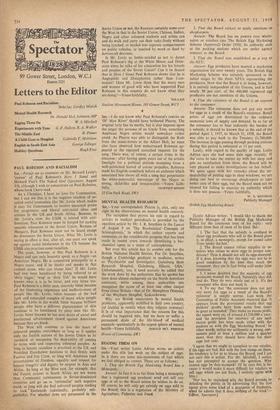SIR,—Your writer Leslie Adrian wrote an article under this title
last week on the subject of eggs. In it there are some mis-statements of fact which we feel obliged to correct. These are as follows:
1. That the British Egg Marketing Board has a Monopoly.
Answer: In fact it is so far from being a monopoly that a registered egg producer need not sell any eggs at all to the Board unless he wishes to do so. Of course, he will only get subsidy on eggs sold to the Board; this is a regulation of the Ministry of Agriculture, Fisheries and Food.
2. That the Board refuses to apply sanctions to shopkeepers.
Answer: The Board has no powers over whole- salers or retailers (see The British Egg Marketing Scheme (Approval) Order 1956). Its authority ends at the packing stations which are under agency contract to the Board.
3. That the Board was established as a sop to the NFU.
Answer: Egg producers have wanted a marketing organisation for over twenty years. The British Egg Marketing Scheme was certainly sponsored in its initial stages by the three NFUs representing the producers. Now that the Board is in being, however, it is entirely independent of the Unions, and in fact nearly 50 per cent, of the 400,000 registered egg producers are not members of the Unions,
4. That the existence of the Board is an expense to the consumer.
Answer: The consumer does not pay any more for eggs as a result of the Board's existence. Retail prices of eggs are determined by the ordinary economic laws of supply and demand. In so far as the consumer has to bear indirectly the burden of a subsidy, it should be known that at the end of the period April 1, 1957, to March 31, 1958, the Board was able to pay back to the Treasury £1,700,000. The increase in eggs passing through packing stations during this period is estimated at 15 per cent.
Lastly, with regard to the quality of eggs, Leslie Adrian says she had some stale eggs recently. If she cares to take the matter up with her shop and gets no satisfaction from them, the Board will be very pleased to make investigations on her behalf. We quite agree with her remarks about the un- desirability of putting eggs in shop windows; we are doing our best to encourage shopkeepers to take better care of their eggs, but the Board must not be blamed for failing to exercise an authority which it does not possess.—Yours faithfully,
British Egg Marketing Board
[Leslie Adrian writes: 'I would like to thank the Publicity Manager of the British Egg Marketing Board for the courteous tone of his reply : very different from that of most of its kind. But: 1. The fact that the subsidy is confined to those egg producers who sell to the Board gives it, in effect, a monopoly, except for casual sales from 'under the hen.'
2. The Board cannot refuse supplies to re- tailers who refuse to store eggs in proper con- ditions? Then it should not sell its eggs stamped. If it does, knowing that the eggs may not be in good condition by, the time they reach the consumer, they are in fact being sold under false pretences.
3. I never doubted that the majority of egg producers wanted the Board. Naturally they did, and do. They do very nicely out of it. It's the consumer who does not want it,
4. To say that 'the consumer does not pay any more for eggs as a result of the Board's existence' is simply untrue. Last week the Committee of Public Accounts reported that it appears from the provisional results that egg packers' profits have been some four times as great as intended.' They make an excess profit, the report went on, of around £1,250,000 a year; and 'no provision for recovery of any such excess profit has been made either with the packers or with the Egg Marketing Board.' In other words, unless my arithmetic is wrong, con- sumers paid at least a million and a quarter more than they should have done for their eggs last year.
'I agree that we ought to complain to our retailer, if his eggs are bad. But with the lion stamp on them, the tendency is for us to blame the Board; and I am not sure this is unfair. For Mr. Mitchell, I notice, has not attempted to answer the question, Why cannot eggs be date-stamped? (If he says this is be- cause it would make it more difficult for retailers to sell eggs which are not fresh, I entirely agree with him.)
'Nor has he explained why the Board persists in deluding the public in its advertising that the lion stamp gives some kind of a guarantee of freshness, when he admits tha,t it does nothing of the kind.'— Editor, Spectator.]






























 Previous page
Previous page